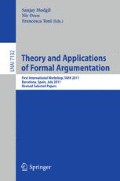Abstract
In the theory of abstract argumentation, the acceptance status of arguments is normally determined for the complete set of arguments at once, under a single semantics. However, this is not always desired. In this paper, we extend the notion of an argumentation framework to a multi-sorted argumentation framework, and we motivate this extension using an example which considers practical and epistemic arguments. In a multi-sorted argumentation framework, the arguments are partitioned into a number of cells, where each cell is associated with a semantics under which its arguments are evaluated. We prove the properties of the proposed framework, and we demonstrate our theory with a number of examples. Finally, we relate our theory to the theory of modal fibring of argumentation networks.
Access this chapter
Tax calculation will be finalised at checkout
Purchases are for personal use only
Preview
Unable to display preview. Download preview PDF.
References
Amgoud, L., Cayrol, C.: On the acceptability of arguments in preference-based argumentation. In: Cooper, G.F., Moral, S. (eds.) UAI 1998: Proceedings of the Fourteenth Conference on Uncertainty in Artificial Intelligence, pp. 1–7. Morgan Kaufmann (1998)
Amgoud, L., Prade, H.: Handling threats, rewards, and explanatory arguments in a unified setting. Int. J. Intell. Syst. 20(12), 1195–1218 (2005)
Baroni, P., Giacomin, M., Guida, G.: SCC-recursiveness: a general schema for argumentation semantics. Artificial Intelligence 168(1-2), 162–210 (2005)
Barringer, H., Gabbay, D.M.: Modal and Temporal Argumentation Networks. In: Manna, Z., Peled, D.A. (eds.) Time for Verification. LNCS, vol. 6200, pp. 1–25. Springer, Heidelberg (2010)
Bench-Capon, T.J.M.: Value-based argumentation frameworks. In: Benferhat, S., Giunchiglia, E. (eds.) NMR, pp. 443–454 (2002)
Brewka, G., Eiter, T.: Argumentation Context Systems: A Framework for Abstract Group Argumentation. In: Erdem, E., Lin, F., Schaub, T. (eds.) LPNMR 2009. LNCS, vol. 5753, pp. 44–57. Springer, Heidelberg (2009)
Caminada, M.: Semi-stable semantics. In: Computational Models of Argument; Proceedings of COMMA, pp. 121–130 (2006)
Caminada, M.: On the Issue of Reinstatement in Argumentation. In: Fisher, M., van der Hoek, W., Konev, B., Lisitsa, A. (eds.) JELIA 2006. LNCS (LNAI), vol. 4160, pp. 111–123. Springer, Heidelberg (2006)
Coste-Marquis, S., Devred, C., Marquis, P.: Prudent semantics for argumentation frameworks (2005)
Dung, P.M.: On the acceptability of arguments and its fundamental role in nonmonotonic reasoning, logic programming and n-person games. Artif. Intell. 77(2), 321–358 (1995)
Gabbay, D.M.: Fibring argumentation frames. Studia Logica 93(2-3), 231–295 (2009)
Modgil, S., Caminada, M.: Proof theories and algorithms for abstract argumentation frameworks. In: Argumentation in Artificial Intelligence, pp. 105–129 (2009)
Prakken, H.: Combining sceptical epistemic reasoning with credulous practical reasoning. In: Dunne, P.E., Bench-Capon, T.J.M. (eds.) COMMA. Frontiers in Artificial Intelligence and Applications, vol. 144, pp. 311–322. IOS Press (2006)
Rotstein, N.D., García, A.J., Simari, G.R.: Reasoning from desires to intentions: A dialectical framework. In: Proceedings of the Twenty-Second AAAI Conference on Artificial Intelligence (AAAI 2007), pp. 136–141. AAAI Press (2007)
Author information
Authors and Affiliations
Editor information
Editors and Affiliations
Rights and permissions
Copyright information
© 2012 Springer-Verlag Berlin Heidelberg
About this paper
Cite this paper
Rienstra, T., Perotti, A., Villata, S., Gabbay, D.M., van der Torre, L. (2012). Multi-sorted Argumentation. In: Modgil, S., Oren, N., Toni, F. (eds) Theorie and Applications of Formal Argumentation. TAFA 2011. Lecture Notes in Computer Science(), vol 7132. Springer, Berlin, Heidelberg. https://doi.org/10.1007/978-3-642-29184-5_14
Download citation
DOI: https://doi.org/10.1007/978-3-642-29184-5_14
Publisher Name: Springer, Berlin, Heidelberg
Print ISBN: 978-3-642-29183-8
Online ISBN: 978-3-642-29184-5
eBook Packages: Computer ScienceComputer Science (R0)

